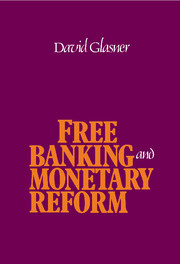Book contents
- Frontmatter
- Contents
- Preface
- Acknowledgments
- PART I A THEORY OF MONETARY INSTITUTIONS
- PART II THE UNCERTAIN PROGRESS OF MONETARY THEORY AND MONETARY REFORM
- PART III A COMPETITIVE MONETARY REGIME
- 8 The competitive breakthrough
- 9 Can competitive banking be safe and stable?
- 10 Why we need a new monetary regime
- 11 A proposal for monetary reform
- References
- Index
8 - The competitive breakthrough
Published online by Cambridge University Press: 16 September 2009
- Frontmatter
- Contents
- Preface
- Acknowledgments
- PART I A THEORY OF MONETARY INSTITUTIONS
- PART II THE UNCERTAIN PROGRESS OF MONETARY THEORY AND MONETARY REFORM
- PART III A COMPETITIVE MONETARY REGIME
- 8 The competitive breakthrough
- 9 Can competitive banking be safe and stable?
- 10 Why we need a new monetary regime
- 11 A proposal for monetary reform
- References
- Index
Summary
It is an extraordinary truth that competing currencies have until quite recently never been seriously examined. There is no answer in the available literature to the question why a government monopoly of the provision of money is universally regarded as indispensable. … Nor can we find an answer to the question of what would happen if that monopoly were thrown open to the competition of private concerns supplying different currencies.
F. A. Hayek, Denationalization of MoneySince the second half of the nineteenth century, the conventional wisdom has been uniformly hostile to the idea of competition in the supply of money. Yet in the nineteenth century that hostility never suppressed the competition. That was because the hostility focused exclusively on competition in issuing banknotes but ignored it in creating deposits.
Why was that distinction made? Mainly because those who most mistrusted competition in the supply of money believed that deposits were not money. That notion was a legacy of the debate over the Bank Charter Act. Members of the Currency School, as we saw earlier, argued against competition in the supply of money and for a legal limit on the quantity of banknotes. They rationalized supporting a limit on banknotes but not on deposits by insisting that only the former, not the latter, were money.
- Type
- Chapter
- Information
- Free Banking and Monetary Reform , pp. 155 - 180Publisher: Cambridge University PressPrint publication year: 1989



